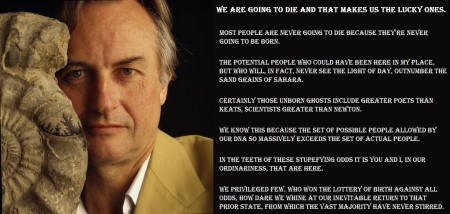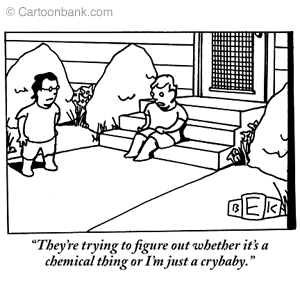“The entire human race” a massive parallel computer?Douglas Adams should get at least a footnote for that.
Julian Barnes introduces Part Three: “Myth will become reality, however skeptical we might be.” I’m skeptical of that, but note the serendipitous propinquity to yesterday's CoPhi discussion of Joseph Campbell and his "power of myth." If myth presages meaning, and the myth of digital technology as our salvation is swamping all other meanings, in our time, then we'd better start paying closer attention.
It’s not just religious apocalyptics who think we’re in the “end times,” we’ve heard about the end of nature and the end of history. Now it’ll be the end of human nature, if the transhumanists have their way (says the Aussie nobelist in Generosity). Are reports of our death exaggerated?
Stone has writer’s block, but if he were writing a book it would apparently be about his creeping feeling of being no longer at home in the world, in our time. Would people buy that book, in their collective wisdom (which he considers “catastrophic”)?
Evolution has designed us to notice life in the bursting present, not so much gradual change over time. That could be our undoing, unless we can catch up culturally.
The “secret of Happiness” is probably not what media reports in our story say it is. Or rather, fulfilling that condition doesn’t tell us how to do it. My hunch is that the secret has a lot to do with learning to live lightly in the present design space nature has foisted upon us. We don’t seem much inclined to do that.
Engineered happiness is one possible “design template for the future,” but finish this book before you decide to endorse it.

And she says: "Everyone alive should feel richly content, ridiculously ahead of the game, a million times luckier than the unborn."
And: "No one should be anything but dead."
And: "Everything that is, is ours."
She’s right, from an elevated and enlightened point of view. But like the rest of us ordinary mortals she’ll also have a hard time holding onto those shining thoughts and holding off intermittent existential despair. Maybe none of us has alleles long enough to sustain our most expansive moments of transcendent insight. Alas. But maybe, too, their very transience and instability is what makes those moments so special.
All writing is re-rewriting, Stone & Powers & Kurton keep saying. In the past that’s always slowed us down and made us think. But if we’re re-writing not just words but genetic code, it may speed us up and change us faster than we can think about. That's the promise and peril of genomics. Stopping the world may not be an option, nor thinking before we change.
As a pragmatist I feel somewhat dissed by Powers’ characterization of the ”witty pragmatism” of the positive psychologist who tells “Oona’s” audience– much like Oprah’s– about happiness. He might be right, though, to advise keeping your options open (“stay loose and keep revising the plan”). Is Powers right to predict that pop media culture will be the largest stage upon which our collective future is to be written? Another scary thought.
But “all the world’s a stage” is scary, too, and there's nothing new about that. Yesterday's pop is today's classic rock. We're an adaptive species, we're easily sold on the new and sentimentally forgetful of the old. What's new from the genomicists and synthetic biologists?
Is he telling us he's found the happiness gene? No. Yes. Maybe... maybe you could market it that way."So medicine keeps getting more complicated. I see the revenue potential there, down the line. But you can't run a business without products. What exactly are you selling?”
Kurton prefers collaborative fiction to singly-authored texts. Consider that, in connection with the Updike-Kelly dispute. I'm all for collaboration, within appropriate bounds, but I’m still in Updike’s (not Kurton’s or Kelly’s) corner.
More Dawkins-esque rhapsodizing about our evolutionary epic:
Six hundred generations ago, we were scratching on the walls of caves. Now we’re sequencing genomes… If that doesn’t inspire us, we don’t deserve to survive ourselves.
That’s a bit harsh, but I’m inspired. I’m also partial to my old-fashioned founts of happiness. Can’t we have both?
Finally, in this oddly self-referential tale that ends in narrative dissolution, Powers asks “What kind of story would ever end with us?” You’ll have to answer that for yourself, but my answer is: the story we’re living at this very moment continues with us. Where it all ends is (for us) the great mystery.
The end of "Generosity" (the novel) is good, if inconclusive and unconventional, because we're all still writing the next chapter. "...[W]hat we will be is ever beyond us." So the story continues. Meanwhile, like our narrator I can still say (at least on a good day) : "I have no choice, delight pours out of me." Hope you all can, too. The Atlas has not yet gone dark. Happiness is still among our possibilities.
So my parting words, for now: be generous, give all to the present, dream of happy futures.
Cue the symphony.

No comments:
Post a Comment